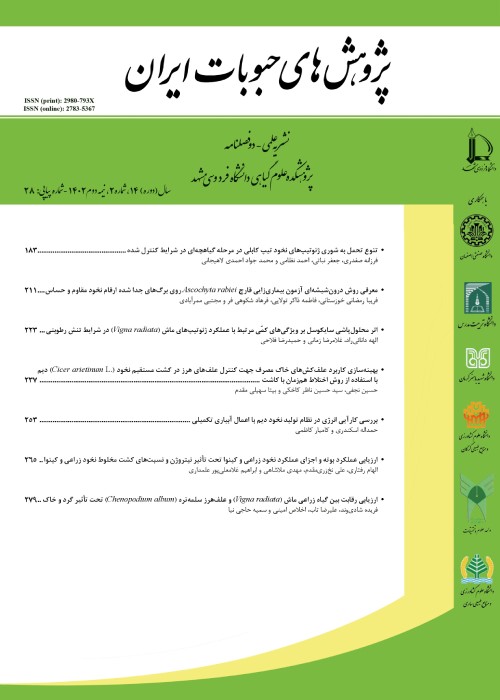Effect of foliar spray of Spermine and Spermidine on growth and some physiological characteristics of chickpea (Cicer arietinum L) under salt stress
Chickpea is one of the most important legumes in Iran. Despite the abundance of cultivated lands in Iran by chickpea, yield per hectare is considerably lower than world average. Environment conditions of chickpea cultivation in infertile, arid and semiarid regions limit the yield production in Iran. Salt stress, resulted from salts accumulation in soil solution is one the limiting factors for chickpea cultivation in arid and semiarid areas. Chickpea is a salt sensitive plant and yield loss is one of the most potential impacts of salinity on chickpea. Polyamines are low molecular weight polycationic molecules, which play important roles in a number of plant physiological processes, including resistance to various stresses. Recently, the role of polyamines, unique polycationic metabolite, was proved as a regulator of growth and plant membrane transport. They also act as a source of reactive oxygen species (ROS) and ROS scavenger and activator of key antioxidant enzymes. Moreover, they are involved in plant stress tolerance. The present study was conducted to investigate the ameliorating effect of spermine and spermidine spraying on yield and yield components of salt treated chickpea plants.
The experiment was performed as factorial based on a randomized complete block design with three replications in research farm of Khartooran Shahrood (salinity 5.7 dS m-1). Spermine was sprayed at three levels (0 (control), 0.25 and 0.50 mM) and spermidine also at three levels (0 (control), 0.25 and 0.50 mM) in three stages including four-leaf, flowering and pod-filling stages. Some attributes such as relative water content, membrane stability index and activity of catalase, polyphenol oxidase and guaiacol peroxidase enzymes, plant height, number of branches per plant, number of pods per plant, number of seeds per pod and seed yield were measured.
The results showed that foliar spray of spermine at the concentration of 0.50 mM increased membrane stability index (15%) and plant height (23%) in comparison with the unsprayed plants. Moreover, foliar spray of spermidine at the concentration of 0.50 mM significantly increased membrane stability index (17%), plant height (31%), number of branches (52%), number of pods per plant (27%), 100- seed weight (16%) and seed yield (15%), when compared to unsprayed plants. Sodium chloride treatment disturbs membrane integrity and leads to ionic imbalances in plants. On the other hand, polyamines as one of the most important growth regulators, play key roles in regulating membrane functions by attachment to anionic sites or to the negatively charged phospholipid head groups on membranes. Their exogenous consumption probably not only reduces absorption of hazardous ions such as Na+ and Cl-, disturbing normal functions of plant cells and reducing growth, but also protect membranes against the stress injuries caused by salt stress. Furthermore, polyamines are able to reverse the inhibitory effect of salinity stress on plant growth by increasing cell division and cell size. Salt stress declines nutrients transportation to growing shoots and also reduces chlorophyll contents which both leads to growth reduction in plants, while polyamines not only accumulate in thylakoid membranes and increase their integrity under stress but also leads to chlorophyll maintenance and by increasing cell division in root tips elevates nutrient absorption and help plants to keep normal growth. Nutrient and carbohydrate deficiency under saline stress is one of probable reasons for abscission of flowers and branch reduction leading to yield reduction which all can be reversed by exogenous polyamine application. Concerning relative water content (RWC) and enzymes activity, interaction of spermine and spermidine had significant effects on RWC and activity of polyphenol oxidase, catalase and guaiacol peroxidase enzymes. ROS scavenging will reduce their major impact on damages to the biomolecules such as membrane lipids, proteins, chloroplast pigments, enzymes and nucleic acids. Polyamines can act as osmoprotectants to increase water absorption under deficit water condition. They also act as ROS scavenger and activator of key ROS scavenging enzymes.
In general, foliar spraying with spermidine was more effective than spermine in mitigating the deleterious effects of salt stress and maintaining the different characteristics of chickpea. Furthermore, application of the concentration of 0.50 mM of both polyamines was more effective than 0.25 mM.
- حق عضویت دریافتی صرف حمایت از نشریات عضو و نگهداری، تکمیل و توسعه مگیران میشود.
- پرداخت حق اشتراک و دانلود مقالات اجازه بازنشر آن در سایر رسانههای چاپی و دیجیتال را به کاربر نمیدهد.



